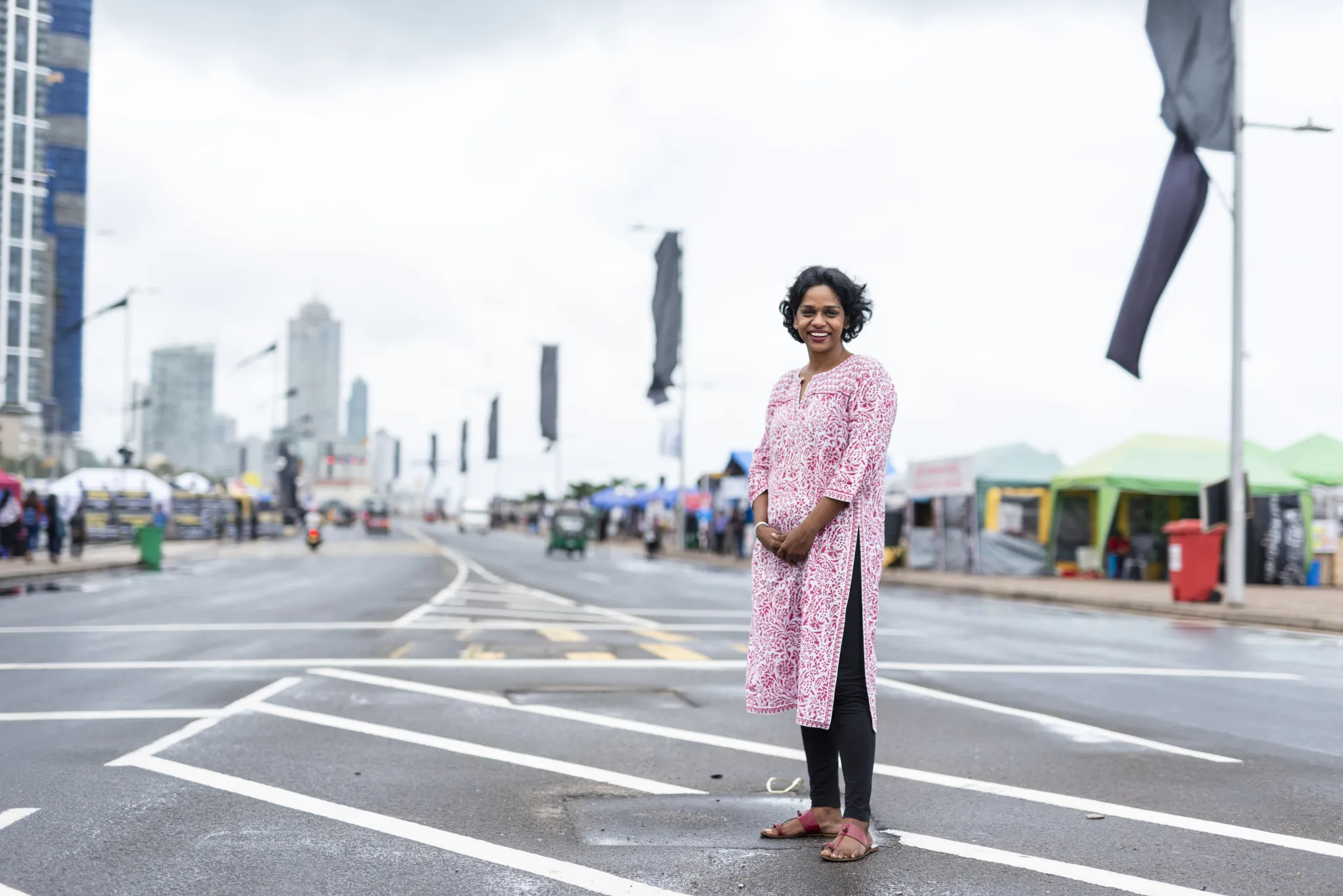Sri Lanka's Long Road to Democratic Reform: A Conversation with Bhavani Fonseka

Seven months since the popular uprising ousted Sri Lanka’s president in July 2022, Sri Lankans are bearing the brunt of its economic crisis.
Tax hikes, subsidy cuts, and heightened living costs provide bitter medicine for a population that thus far lacks confidence in its government. The austerity measures might also offer some leverage to the political opposition ahead of local government elections scheduled for 9 March.
Following former President Gotabaya Rajapaksa's resignation, Ranil Wickremesinghe's appointment to office by a parliament that had lost the trust of its people shows that he is not there by the people’s mandate. Indeed, the continued crackdown on peaceful protests does not bode well for the process of renegotiating Sri Lanka's social contract, which appears to be at a crossroads in its constitutional order. Yet protesters continue in their demands for transparent and accountable leadership, which include calling for fresh elections, abolishing the executive presidency, restoring the independence of key institutions, and auditing politicians to combat a culture of corruption and impunity that has plagued Sri Lanka’s political and business communities for years.
To better understand the political climate ahead of these elections, as well as where the "Aragalaya" protest movement now stands, I spoke to Bhavani Fonseka, a Senior Researcher at the Centre for Policy Alternatives, and a prominent constitutional and human rights lawyer, who has experienced the turmoil firsthand in Colombo.
How would you describe the political climate in Sri Lanka since the July 2022 protests and President Ranil Wickremesinghe took office?
Sri Lanka has seen quite an upheaval in terms of its political landscape. It’s a troubling picture entering 2023 in terms of the political reforms [needed]. We're seeing some form of coherency in governance [in terms of stabilizing the economy and acknowledging some key reforms needed] from the present government, but there is also pushback on reforms they're trying to introduce because of the uncertainties due to high inflation, increased tariffs, and taxes. President Ranil Wickremesinghe, who was elected to office by Parliament in July 2022, is deeply unpopular amongst sections of the public, and in the last couple of months, the economic situation has gotten worse, which without sufficient reforms and money coming in was expected. People are finding it increasingly difficult to get essential items like food, medicine, etc. and there is new data coming out that malnutrition is high, so there doesn't seem to be any end in sight in those areas.
Protests continue in Sri Lanka, although the scale of those protests are different and we're not seeing the massive numbers as evidenced in 2022. This year also marks Sri Lanka’s 75 years of independence, a time when reflection is needed in terms of what has been achieved and where Sri Lanka is heading.
What types of significant reforms has Sri Lanka seen in response to protesters’ demands? What steps have been taken to improve the political system of governance?
Firstly, this was a huge expectation among protestors that there will be a change in terms of the system of governance. A poll we did in 2022 indicated that there's high support for abolishing the executive presidency in ensuring proper checks and balances and calls for greater transparency [and] accountability of elected representatives. In 2022, Wickremesinghe brought in the 21st [introduced initially as the 22nd] amendment to the Constitution, which introduced some changes in governance [aimed at apportioning governmental powers and establishing independent oversight committees that oversee human rights and anti-corruption investigations], but did not abolish the executive presidency. So, while there have been some political reforms, they’re seen as insufficient [and vulnerable to political interference].
The government says there's only so much one can do in times of a crisis and that the reforms require more time, which is I think a fair point. But it's this kind of moment where so many people came out demanding change and attributing the crisis to this all-powerful executive president... It's a moment, I think, where these ambitious reforms should have happened. That said, the president has had several rounds of talks with opposition parties to see if some kind of political reforms are possible, but I think many remain very sceptical with progressive reforms materializing in the present context.
Local elections are scheduled to go ahead on 9 March despite government efforts to delay and invalidate preparations. Delay tactics noted so far include several rounds of talks held in January between Wickremesinghe and his cabinet members after summoning the Election Commission (EC) to discuss election postponement and citing "financial difficulties." Despite several petitions seeking to postpone the elections, the Supreme Court issued a critical verdict on 10 February saying that it is for the EC to act on undertaking elections. Yet disruptions held hostage by funding continue, as seen in the recent development of the Government Printer refusing to print ballot papers for postal voting unless paid in advance by the EC. What’s your outlook on these elections, and what can we expect to see coming out of these?
We will have to see if elections are held as announced on March 9. The government is already saying there are insufficient funds and that “this is not the time [to hold elections],” with various tactics being used to try to delay these elections. This is extremely worrying because they have been postponed before, and in Sri Lanka, elections are critical. It’s an unprecedented time since it would be the first election during an economic crisis, but also within a few months of a government being kicked out of office. These local elections will offer a first outlet for the citizenry to [express their political will]. Notably, these elections are for local authorities [and] elected representatives who would be working closely with the people and have the closest impact in terms of people's living conditions and services available to them.
How has the political and economic crisis altered the dynamic/relationship between politicians and those governed in Sri Lanka?
There's really been a reawakening of the citizen, from being complacent to dynamic activism with greater agency. Yet it’s also in the context where there's deep distrust towards institutions and politicians. In the [aforementioned] poll done last year by my institution, 98% said that politicians should be audited. Many see politicians as being corrupt and that more needs to be done to hold politicians accountable. So there is a divide, because while there are new actors coming out, some of the old still remain in office who face allegations of corruption. Whether citizens continue and sustain those demands and activism for reform and accountability this year amidst the economic crisis are the things we need to look to this year.
What key political reforms are needed to bridge the trust deficit between the public and policymakers?
Abolishing the executive presidency is a critical demand; I'm a bit cynical whether it'll even happen in the near future but it is a key need considering the impact such a powerful office has had on governance and the economy of Sri Lanka. The second thing is ensuring corruption and the whole issue of economic crimes is addressed. The government needs to ensure there are independent institutions; investigations that are followed through with prosecutions; [and] that there are checks in terms of the wealth that comes into the hands of particular individuals, which calls for better monitoring.
On a range of issues, the government has said they want to bring in certain things like an anti-corruption law (that is yet to happen) or whether parliamentarians or public officials will be made to declare their assets. The whole issue of political reforms and whether there can be a settlement of ethnic questions, which has plagued Sri Lanka for decades and whether there can be some movement on that is also critical. The president has had some rounds of discussions to explore whether the 13th Amendment to the Constitution [which involves devolving land and police powers to provinces] can be fully implemented. That's important if some positive movement is made. The government is also now in talks with the International Monetary Fund, and there is now this recognition that some governance reforms [aimed at reducing corruption vulnerabilities] are needed and go hand in hand if assistance is to come to Sri Lanka. Hopefully some of the pressure points work and we have progressive reforms happening this year.
What will the societal consequences be for Sri Lankans if we don’t see these reforms materialize?
We’re seeing a lot of people migrate [out of Sri Lanka], which contributes to brain drain. Many left during the civil war, but what is happening now is at a different scale altogether. So, while there may be economic concerns and lack of movement on key governance reforms, from a human side of it, we are also seeing many young people not having much hope or feeling that there's a future in this country. And that's worrying because the question looms as to who will take this country forward in the future.
To end on a positive note, this new activism we're seeing among the citizenry also gives hope that people are being creative in how they hold politicians [and] public officials accountable. We're seeing new energy among the activists, lawyers and social media users coming out. So, while there is kind of a negativity at one level, the Aragalaya [and] the protest of 2022 has opened up spaces, and these need to be sustained.
This interview has been edited for length and clarity.




